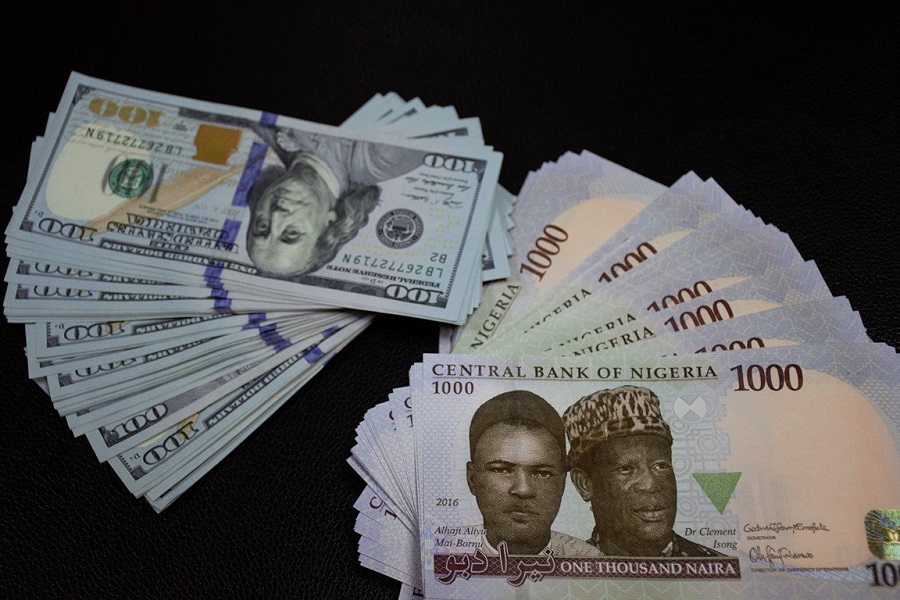Naira Fall Across Official And Parallel Markets, Weighs Down Forex Reserves—The Genius Media Nigeria reports that the naira depreciated across official and parallel markets at the weekend following sustained demand pressure for the dollar.
This led to the depletion of the foreign exchange (forex) reserves by $187.6 million.
There were also concerns over rising trade deficit and possible further official devaluation of the national currency.
The local currency depreciated by 0.1 per cent to N415.10/$ at the official Investor and Exporter (I & E) Window and it fell by 1.2 per cent to N574/$ at the parallel market.
It, however, closed flat at N430/$ at the Interbank Foreign Exchange market as the Central Bank of Nigeria (CBN) sustained its weekly injections of $210 million in support of the apex bank’s floating management of the national currency.
The apex bank allocated $100 million to Wholesale Secondary Market Intervention Sales (SMIS) and $55 million each to Small and Medium Scale Enterprises and invisibles.
With the naira management pressure, the nation’s forex reserves declined by $187.63 million to $40.93 billion, according to the latest update provided by Cordros Capital, a major investment banking group, at the weekend.
Most analysts appeared to be unanimous on the precarious position of naira and forex reserves, especially with last week’s national data showing increasing trade deficit.

The management of Cowry Asset, which said there was a relationship between naira devaluation and trade deficit, noted that widened trade deficit amid rising petroleum products and manufactured goods imports partly triggered the pressure on the naira against the dollar, which led to devaluation of the naira by the CBN in the third quarter of 2021.
It said: “In the new week, we expect naira to weaken slightly against the dollar as crude oil price may fall slightly amid threat of lockdown due to the new COVID-19 variant.”
Cordros Capital noted that while the CBN may have enough
supply to sustain the forex market over the short term, given recent inflows from the issued Eurobond and the IMF’s SDR, the medium to long-term stability of the national currency remains uncertain.
According to analysts at Cordros Capital, foreign inflows are paramount for sustained forex liquidity over the medium term, in line with expectation that accretion to the reserves will be weak given that crude oil production levels remain quite low.
Cordros Capital pointed out that foreign portfolio investors (FPIs), which have historically supported supply levels in the I & E Window will be needed to sustain forex liquidity levels. About 53.8 per cent of forex inflows to the I & E Window in 2019 came from FPIs.
Analysts further said adjustments in the naira-dollar peg closer to naira’s fair value and flexibility in the exchange rate would be significant in attracting foreign inflows back to the market.
The latest economic report by the National Bureau of Statistics (NBS) showed that Nigeria’s trade deficit increased by 61.6 per cent to N3.02 trillion in third quarter 2021 from N1.87 trillion in second quarter 2021. This marked eighth consecutive quarter of negative trade balance.
The increased trade imbalance was due to 17.3 per cent increase in total imports from N6.95 trillion in second quarter 2021 to N8.15 trillion in third quarter 2021. However, total exports inched up by 1.0 per cent from N5.08 trillion in second quarter 2021 to N5.13 trillion.
“We expect lower crude oil production volume to limit export earnings over the short term. At the same time, we expect total imports to increase slowly in line with domestic economic performance. Accordingly, we expect the trade balance deficit to grow moderately over the short term,” Cordros Capital stated.
A Senior Research Analyst at FXTM, Lukman Otunuga, outlined that there were several factors weighing on the naira, listing the prevalent 16.63 per cent inflation rate as one of such challenges.
In such a situation, the forces of demand and supply are not in equilibrium. It is usually the case that demand is higher than supply.
He listed other factors affecting the inflow of foreign exchange as oil prices per barrel, import dependence, and the land border closure.
Otunuga added that given how the fundamentals still point to tight market conditions, the path of least resistance for crude oil remains north. Despite the high crude oil prices, a sizeable portion of the country’s foreign exchange has depreciated due to the continued importation of refined petroleum products.
Otunuga said: “Apart from dependence on imported fuel, the Nigerian economy is dependent on imported goods and products. This is another avenue for the outflow of the limited forex into other economies.
Another factor affecting the inflow of foreign currency into the country is the border closure by the Federal Government since 2019. It has also slowed down the inter-country trade channels between Nigeria and neighbouring states, hence limiting the flow of foreign currency into the country.”





![OBA AJAGUNGBADE: Remains Of Late Soun Of Ogbomoso Buried [PHOTOS]](https://www.thegeniusmedia.com.ng/wp-content/uploads/2021/12/WhatsApp-Image-2021-12-13-at-06.17.08.jpeg)
